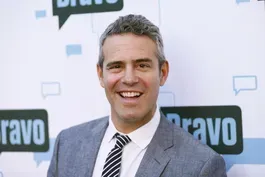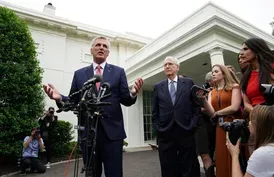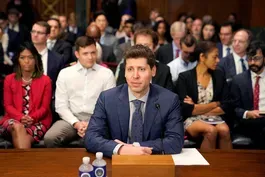
MLK biography reveals new details about civil rights leader
Clip: 5/16/2023 | 8m 34sVideo has Closed Captions
New MLK Jr. biography reveals civil rights leader was misquoted in criticism of Malcolm X
The first major biography of Dr. Martin Luther King Jr. in roughly forty years is out. Jonathan Eig's "King: A Life" has important new revelations about the civil rights leader and what he dealt with as a public activist and a private citizen. Eig sat down with Geoff Bennett to discuss the new book and his research.
Problems with Closed Captions? Closed Captioning Feedback
Problems with Closed Captions? Closed Captioning Feedback
Major corporate funding for the PBS News Hour is provided by BDO, BNSF, Consumer Cellular, American Cruise Lines, and Raymond James. Funding for the PBS NewsHour Weekend is provided by...

MLK biography reveals new details about civil rights leader
Clip: 5/16/2023 | 8m 34sVideo has Closed Captions
The first major biography of Dr. Martin Luther King Jr. in roughly forty years is out. Jonathan Eig's "King: A Life" has important new revelations about the civil rights leader and what he dealt with as a public activist and a private citizen. Eig sat down with Geoff Bennett to discuss the new book and his research.
Problems with Closed Captions? Closed Captioning Feedback
How to Watch PBS News Hour
PBS News Hour is available to stream on pbs.org and the free PBS App, available on iPhone, Apple TV, Android TV, Android smartphones, Amazon Fire TV, Amazon Fire Tablet, Roku, Samsung Smart TV, and Vizio.
Providing Support for PBS.org
Learn Moreabout PBS online sponsorshipWILLIAM BRANGHAM: The first major biography of Dr. Martin Luther King, Jr. in roughly 40 years is now out, and it has important new revelations about the civil rights leader and what he dealt with as a public activist and a private citizen.
Geoff Bennett spoke recently with the author for our "NewsHour" Bookshelf.
GEOFF BENNETT: In his new biography, "King: A Life," author Jonathan Eig sets out to president Dr. Martin Luther King Jr. as more than a civil rights icon, but as a radical thinker with a rebellious side and, at the same time, paint a more human portrait.
Jonathan Eig joins us now to discuss his research and what else we can expect in his new comprehensive biography of Dr. King.
Jonathan Eig, thanks for being with us.
JONATHAN EIG, Author, "King: A Life": Thank you.
GEOFF BENNETT: And you have written books about Muhammad Ali, Al Capone, Jackie Robinson, some of the most consequential figures in American life.
In some ways, it makes sense that you would write a biography about Dr. Martin Luther King Jr.
But how did in the beginning that there would be anything new to say, anything new to add to the public's understanding of his life?
JONATHAN EIG: I began really simply.
I knew that there were lots of people around who knew Dr. King, people who were still alive.
I was interviewing some of them for my Muhammad Ali book.
And I just figured, my time would be really well spent traveling the country the next few years interviewing people who knew Martin Luther King Jr., because the time was running short.
And once I started doing that, I realized that there were also a lot of new archival documents that had come online since the last batch of books were written.
It had been a good 30, 40 years since the last big King biographies were written.
So I really hit the sweet spot.
I had people who knew King still around, and I had a ton of new archival material.
So I was off to the races.
GEOFF BENNETT: How did Dr. King's upbringing affect his later activism?
JONATHAN EIG: Martin Luther King Jr. was - - of course, he was born Mike King.
He was raised in the church, but not just in the church where religion was concerned, in the church where religion was seen as a tool to try to change society, that America needed to live up to the words in the Bible and the words in the Constitution.
And preachers were leading that charge.
At a time when a lot of Black people were afraid to speak out because they might lose their jobs, Black preachers had a level of independence.
So, King learned the Bible before he could read, and he learned the courage of Black preachers before he ever went to school.
GEOFF BENNETT: There's also the monumental revelation, based on your research in the book, that King's famous criticism of Malcolm X was just not true, that the interview that he gave Alex Haley, that Alex Haley misquoted his comments, and that forever changed the historical view of the relationship between Martin Luther King and Malcolm X.
Tell us about that and how you discovered it.
JONATHAN EIG: This was one of the most shocking discoveries that I made.
As a routine, when I'm writing a book, if someone does a good interview with my subject, I will look for the original tapes of that interview.
I will look for the transcripts of the tapes, the notes just to see if they left anything out.
And I went to look for the Alex Haley interview.
It's the longest interview ever published with Martin Luther King Jr. And the tapes were not available, but the transcripts were.
And they were at Duke University's Rubenstein Library.
And when I read through the transcripts, I was shocked, because the most famous criticism that Martin Luther King had of Malcolm X came from that interview in "Playboy," when he said that -- Martin Luther King said that Malcolm's fiery, demagogic oratory would bring nothing but grief, that his violence was doing nothing but harm to Black people in America.
King never said that.
And the quotes had been changed dramatically.
Some of them had been entirely invented.
And we have been telling the story of the relationship between Martin Luther King and Malcolm X for generations, based in part on that quote, the sense that Martin Luther King had this antagonism.
And it just wasn't true.
What King said in that interview was that: I don't know that I have all the answers.
I don't want to be so arrogant as to think that everything I say and do is right.
I'm interested in what Malcolm has to say.
I don't like his calls for violence.
But they seemed to agree on the call for Black dignity, on the call for Black equal rights.
They agreed on much more than they disagreed on.
GEOFF BENNETT: Do you have a sense of why Alex Haley would fabricate those comments?
JONATHAN EIG: Well, it's complicated.
I think there was a sense of, maybe he wanted to stir up controversy.
Maybe it was his editors pushing him.
We don't know.
But, unfortunately, he played into the hands of those, including the FBI, who were trying to stoke controversy and dissension between Black leaders in America.
There was a sense that if we could divide the important Black leaders in America, we could keep them from really moving the masses toward the kind of society that they sought with equality.
And the people who were destined -- who were intent on preserving the white power structure wanted to see Malcolm and Martin Luther King not getting along.
GEOFF BENNETT: You mentioned the FBI surveillance operation against Dr. King.
There's some new information that you uncovered that you include in the book.
How did that affect his relationship with President Johnson at the time, which was a critical moment in the civil rights movement?
JONATHAN EIG: This was one of the other really stunning revelations for me in my research for this book.
I found the private papers, the J. Edgar Hoover -- the private memos that he was sending directly to President Johnson.
These were not contained in President Johnson's regular archives.
He asked his secretary to store them in a safe, so I found them in his secretary's papers.
And what they showed was that Hoover was writing directly to the president sometimes three, four times a week with specific details, really sometimes very petty details, about Martin Luther King Jr. And it really seems to have done great damage to the relationship.
I think the relationship between Martin Luther King Jr. and President Johnson was the greatest single relationship between an activist and a president in our country's history.
But that relationship was slowly undermined and really destroyed by J. Edgar Hoover's leaks and, I should, say by LBJ's complicity in that.
Johnson was encouraging Hoover to keep it up.
GEOFF BENNETT: How do you approach navigating the challenges of presenting a balanced and comprehensive portrayal of Dr. King's life, considering both his remarkable achievements and his personal flaws?
JONATHAN EIG: I think it's very important to be honest about our heroes.
King was deeply flawed.
He knew it.
He talked about it in his sermons.
He was not perfect.
And I want to balance that so that readers of this book understand that our heroes don't have to be perfect.
If we expect perfection, A, we have a very boring story on our hands, but, B, we can't really hope to ever emulate the great men and women in our history, because none of us are perfect.
So I think readers are smart enough to see King, accept his flaws, wrestle with them, as he did, but still appreciate his greatness and all that he accomplished and how he continues to inspire us.
GEOFF BENNETT: You think so?
I think we have so few heroes that there are so many people who are invested in the mythology.
JONATHAN EIG: Well, part of our problem is that people are afraid to step into roles of leadership today, because they might be criticized for something in their background that might not be quite so honorable.
And that discourages people from taking chances.
You have to take a chance to be a leader.
Martin Luther King didn't look to be a leader.
He wasn't asked -- he wasn't asking to become the leader of the civil rights movement.
He was thrust into it.
And he had doubts about himself.
One of the things that's really painful, we have these FBI transcripts of his conversations.
His phones were being tapped.
His home phone, his office, his friends' phones were being tapped.
And we can hear him in these -- in these phone calls basically pleading for understanding: Why is everybody treating me so badly?
Why is - - why are the newspapers criticizing me so?
Even his friends, when they -- when they say to him, you should just stick to the voting rights in the South, you're -- you're making too many enemies, you're costing us support by speaking out on Northern racism by speaking out on the Vietnam War, King is begging them, don't you understand me?
Don't you understand that this comes from my religious beliefs?
I'm not a politician.
I'm not trying to do what's best for my approval ratings.
I'm trying to do what God commands us to do.
And you feel his pain.
So I think it's important that we accept -- and I think we can appreciate him more and respect him more when we accept his flaws.
GEOFF BENNETT: Well, the book presents a vivid portrait of Dr. King.
It is exceptional, Jonathan Eig.
The book is "King: A Life."
Thanks so much for being with us.
JONATHAN EIG: Thank you.
Andy Cohen on his latest adventure as the father of two kids
Video has Closed Captions
Clip: 5/16/2023 | 8m 10s | Andy Cohen on his latest adventure as the father of two kids (8m 10s)
Biden, GOP leaders make little progress on debt ceiling deal
Video has Closed Captions
Clip: 5/16/2023 | 8m 5s | Biden and GOP leaders meet but make little progress on debt ceiling deal (8m 5s)
OpenAI CEO tells lawmakers AI regulation is needed
Video has Closed Captions
Clip: 5/16/2023 | 10m 55s | Why artificial intelligence developers say regulation is needed to keep AI in check (10m 55s)
Schools hope apprenticeships will alleviate teacher shortage
Video has Closed Captions
Clip: 5/16/2023 | 7m 20s | School administrators hope apprenticeship programs will alleviate teacher shortages (7m 20s)
Why the northern lights are being seen further south
Video has Closed Captions
Clip: 5/16/2023 | 2m 36s | Why the northern lights are being seen further south (2m 36s)
Providing Support for PBS.org
Learn Moreabout PBS online sponsorshipSupport for PBS provided by:
Major corporate funding for the PBS News Hour is provided by BDO, BNSF, Consumer Cellular, American Cruise Lines, and Raymond James. Funding for the PBS NewsHour Weekend is provided by...















